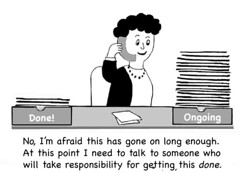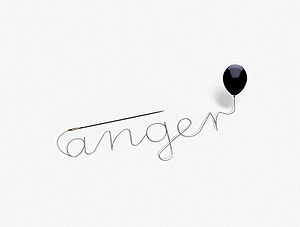On the behavioral spectrum, people who lack confidence for whatever reason are at the opposite end of the spectrum from individuals who seem to be over confident. The under confident tend to chronically respond to people and situations by withdrawing, not speaking up, not expressing their opinions, being overly nice, or not asking for what they want. On the over confident end of the spectrum we find individuals who chronically use intimidation, anger or bullying to get what they want in life. When we analyze both sets of issues, it seems obvious that the individuals lacking in confidence need to be strengthened and the angry folks need to dial back the intensity of their responses to a less intense level.
 Assertiveness, the topic of today's post, is in the middle of the spectrum and is really what each of these groups need to learn and practice as they communicate with others. Although not as apparent, assertiveness skills are missing in both of these groups. On the one end of the spectrum, we might find the less confident person came from a family where conflict was avoided rather than dealt with. In this situation, the child observing conflict being avoided or even not seen at all, will leave the child with little modeling of how to handle a conflict. They will not learn how to be assertive, or how to negotiate through a conflict if they have never seen parents or important authority figures in their lives model that type of behavior. This leaves them with an assertiveness deficit which looks like low confidence levels. It can result in a low level of confidence, but in many situations, it is a skill deficit because they don't know what to do or how to respond.
Assertiveness, the topic of today's post, is in the middle of the spectrum and is really what each of these groups need to learn and practice as they communicate with others. Although not as apparent, assertiveness skills are missing in both of these groups. On the one end of the spectrum, we might find the less confident person came from a family where conflict was avoided rather than dealt with. In this situation, the child observing conflict being avoided or even not seen at all, will leave the child with little modeling of how to handle a conflict. They will not learn how to be assertive, or how to negotiate through a conflict if they have never seen parents or important authority figures in their lives model that type of behavior. This leaves them with an assertiveness deficit which looks like low confidence levels. It can result in a low level of confidence, but in many situations, it is a skill deficit because they don't know what to do or how to respond. On the other hand, individuals who are over aggressive in their responses, either by getting angry, intimidating with their size or voice volume as well as those who may manipulate for what they need, also lack assertiveness skills. These individuals have never learned what the appropriate level of response is; that there is a difference between assertiveness and aggression. This group tends to respond with a high level of aggression or none at all in the situations they deal with. For this group of individuals, it is essential for them to be able to determine in any given situation what level of response is appropriate.
For those who lack self-confidence, it is a common experience to be treated in a condesending manner, or even directly put down and not be able to think of how to respond until later. Some of that is due to the physical shut down of the higher functions in the brain that control thought processes, which come when we get anxious or fearful. As anxiety increases, we move toward the fight, flight or freeze response and our thought processes become very primitive. This is why it is so important to role play certain scenarios and train how to respond in those situations. If you have never practiced being assertive, you won't learn it by being in the situation. Determine what you might say if someone puts you down by saying a derogatory remark and then passing it off as humor. For example, inappropriate co-worker might say to you, "That was a great answer, for someone your age...ha, ha, ha." Someone with a low confidence level might just smile and not say anything. However an appropriate answer might be to look at the co-worker and say, "I'm confused by what you just said. What was your point?" This can be said very kindly and in a non-threatening manner, but it makes the point that the comment was inappropriate and makes the person say what they meant to say directly.
 Overly aggressive individuals must learn the appropriate assertiveness skills that will help them accomplish what they want to accomplish, but not in an indirect or inappropriate way. These individuals must step back and determine what level of strength the situation might require. For example, if a family member continues to pry into private or personal matters, rather than responding aggressively, determine what level of strength would set the appropriate boundary. Anger would be inappropriate in this situation. However, using some assertiveness skills like lowering your tone of voice, looking the person in the eye and stating that, "I prefer not to talk about this right now", or "perhaps I haven't made myself clear that I'd rather not discuss this topic", or asking, "Why is it that you want to know these things" might be a less aggressive way to set the boundary.
Overly aggressive individuals must learn the appropriate assertiveness skills that will help them accomplish what they want to accomplish, but not in an indirect or inappropriate way. These individuals must step back and determine what level of strength the situation might require. For example, if a family member continues to pry into private or personal matters, rather than responding aggressively, determine what level of strength would set the appropriate boundary. Anger would be inappropriate in this situation. However, using some assertiveness skills like lowering your tone of voice, looking the person in the eye and stating that, "I prefer not to talk about this right now", or "perhaps I haven't made myself clear that I'd rather not discuss this topic", or asking, "Why is it that you want to know these things" might be a less aggressive way to set the boundary. Assertiveness, like diplomacy, is an art in being able to communicate. Once we have a few of the skills in our relationship tool box, we can negotiate many of the difficult situations that we come across quite well. However, there may still be the person or the situation that we choose to avoid, just because it makes good sense to do so. Depending on how assertive we become, we can still be thought of as aggressive if we use our assertiveness skills in an overbearing or inconsiderate way. It is always good to take stock of any situation we find ourselves in and determine how best to respond. Assertiveness gives us the tools to be able to ask for what we want, give our opinions without being offensive and stand up for ourselves when we believe we are being misjudged. These tools do not give us the right to mistreat or be inconsiderate of anyone we are relating with.

 If you believe learning assertiveness skills would be of benefit to you, you might consider finding a group counseling situation that is working on these issues, an individual counselor or if you are more of a self help type person, there are many good books and resources available on the topic. Your Perfect Right is a good resource, in my opinion. It gets a little bogged down in the details, but the author has gone to great lengths to give people step by step information in how to develop assertiveness skills in their lives. The Assertiveness Workbook is also a good resource if you want to practice your skills.
If you believe learning assertiveness skills would be of benefit to you, you might consider finding a group counseling situation that is working on these issues, an individual counselor or if you are more of a self help type person, there are many good books and resources available on the topic. Your Perfect Right is a good resource, in my opinion. It gets a little bogged down in the details, but the author has gone to great lengths to give people step by step information in how to develop assertiveness skills in their lives. The Assertiveness Workbook is also a good resource if you want to practice your skills.As you seek to improve your communication skills, expect that you will relapse from time to time. The way you have communicated all your life is somewhat of a default setting and it will take some time to change. Look at these small setbacks as learning experiences and decide what you could have done differently to effect a different outcome. Every time you do something different, it will take you to a different outcome. Decide through the process what works and what doesn't. You will soon be able to negotiate difficult circumstances with confidence and the right level of assertiveness.









4 comments:
I like this! I definitely need to work on my speaking up skills, though I am better about it than I used to be. :)
Thank you so much for the positive feedback. Learning to be assertive is not only a skill deficit, but as you may know, dealing with the underlying issues that may be contributing to a lack of confidence in oneself. A good balance of both sides of the issue helps greatly in returning to healthy functioning. I'm sure you are moving forward as is appropriate for your life. Those around you can see and are proud of you.
I am so grateful for this and the other articles I've been reading. I've just begun couple's counseling with my husband of 16 years. We've been seperated since June 2012 that involved a domestic violence situation and consequently a temporary restraining order. I actually found your site when searching for information regarding marriage after abuse. I feel so much more equipped for the next session - I can't thank you enough for the information you've posted. May God richly bless your work!
So glad that this was helpful. I wish you all the best as you start your counseling journey. Be wise and listen to your inner senses.
Post a Comment